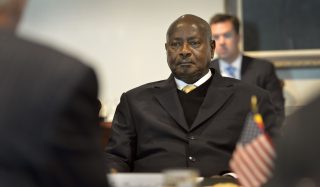Throughout Sub-Saharan Africa, the advocation for presidential term limits has been a way to ensure that sitting executives do not remain entrenched and political opportunities are created for competitive elections and alternations in power. However, when this cap that ensures a certain level of democracy is consistently evoked and altered during constitutional reforms, the nation is left with an authoritarian system of government.
President Yoweri Museveni has ruled Uganda for thirty-one years and is currently seeking constitutional amendments to enable him to continue for the seventh term in 2021. Though the idea of his intentions is outrageous, the Ugandan parliament is currently reviewing the constitution to ensure that the aged leader is eligible for re-election come 2021.
Under the existing constitution, a person standing for president must be under 75 years of age – which would make Museveni, 73 – ineligible to stand in the next polls. To this effect, a parliamentary sitting was held on Tuesday, 3rd October and all Members of Parliament opposing the law were either barred from attending or stayed away as a form of protest. Prior to this time, a fight broke out in parliament for two consecutive days between legislators opposed to the plan and those supporting it.
A broad spectrum of Ugandans, including the political opposition, religious leaders, rights activists and some members of the ruling party, have voiced opposition to removing the current age cap. In 2005, Museveni also had the constitution amended to remove term limits, enabling him to stand successfully for a third, fourth and fifth consecutive term. These attempts led to conflicts and imprisonments of some opposition members during the time.
Museveni’s bid to remain in power in Uganda – a prospective crude oil producer and Africa’s largest coffee exporter – follows a growing trend in the region. The once celebrated Museveni has gradually become less popular as most people now see him as a dictator and authoritarian leader.
Also, in Burundi, Mauritania, Cameroon, Equatorial Guinea and the Democratic Republic of Congo, efforts by leaders to change constitutional rules to retain power have sparked instability and political unrest in different regions. Evidently, the future of presidential term limits on the continent is still evolving, as many countries contend with the difficulties of building a democracy.
Across sub-Saharan Africa, term limits have been included in 34 constitutions implemented since the 1990s. But these provisions have been fully respected in only one-fifth of the countries.
Where term limits are revoked, authoritarian stability is typical because the incumbent president and party stay in power. Even when the rule survives, it can sometimes be circumvented, as happened in Burundi and Senegal where incumbents exploited technicalities to run for further terms. Also, in some cases, term limits have continued without challenge because a dominant or authoritarian party has well-established procedures for replacing the top brass with new leaders, as in the case of Tanzania.
Consequently, as one inexperienced African democracy after another tries to navigate these tricky waters of term limits, the international policymakers can help – by supporting domestic forces working to create more openings for democratic regimes, and also helping previously elected presidents to make graceful exits to new roles in regional and international bodies. Presidential term limits are not absolute remedies, but when respected they can facilitate peaceful transitions and democratic regimes.








